Metacognitive Therapy for Alcohol Abuse and Dependence: Evidence and Applications
VerifiedAdded on 2024/05/29
|8
|2839
|110
AI Summary
This essay explores the principles of metacognitive therapy (MCT) and its effectiveness in treating alcohol abuse and dependence. It delves into the concept of metacognition, its role in psychological disorders, and how MCT addresses problematic thought patterns associated with addiction. The essay examines the evidence supporting MCT's use in alcohol dependence, highlighting its unique approach compared to traditional cognitive behavioral therapy (CBT). It also discusses the triphasic formulation of metacognition in alcohol dependence and the potential benefits of combining MCT with motivational interviewing. Finally, the essay emphasizes the importance of identifying trigger factors and developing coping mechanisms to promote long-term recovery.
Contribute Materials
Your contribution can guide someone’s learning journey. Share your
documents today.
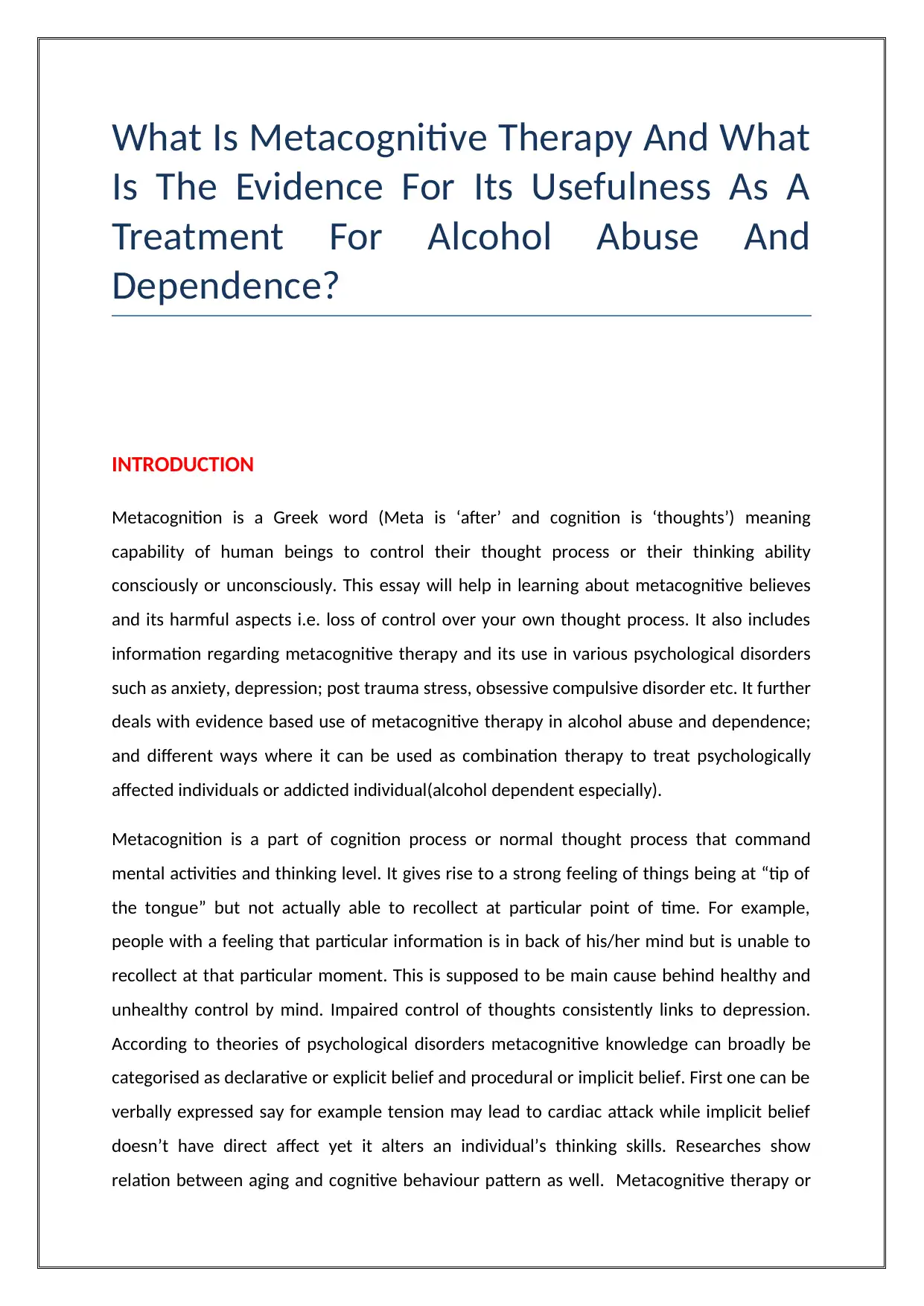
What Is Metacognitive Therapy And What
Is The Evidence For Its Usefulness As A
Treatment For Alcohol Abuse And
Dependence?
INTRODUCTION
Metacognition is a Greek word (Meta is ‘after’ and cognition is ‘thoughts’) meaning
capability of human beings to control their thought process or their thinking ability
consciously or unconsciously. This essay will help in learning about metacognitive believes
and its harmful aspects i.e. loss of control over your own thought process. It also includes
information regarding metacognitive therapy and its use in various psychological disorders
such as anxiety, depression; post trauma stress, obsessive compulsive disorder etc. It further
deals with evidence based use of metacognitive therapy in alcohol abuse and dependence;
and different ways where it can be used as combination therapy to treat psychologically
affected individuals or addicted individual(alcohol dependent especially).
Metacognition is a part of cognition process or normal thought process that command
mental activities and thinking level. It gives rise to a strong feeling of things being at “tip of
the tongue” but not actually able to recollect at particular point of time. For example,
people with a feeling that particular information is in back of his/her mind but is unable to
recollect at that particular moment. This is supposed to be main cause behind healthy and
unhealthy control by mind. Impaired control of thoughts consistently links to depression.
According to theories of psychological disorders metacognitive knowledge can broadly be
categorised as declarative or explicit belief and procedural or implicit belief. First one can be
verbally expressed say for example tension may lead to cardiac attack while implicit belief
doesn’t have direct affect yet it alters an individual’s thinking skills. Researches show
relation between aging and cognitive behaviour pattern as well. Metacognitive therapy or
Is The Evidence For Its Usefulness As A
Treatment For Alcohol Abuse And
Dependence?
INTRODUCTION
Metacognition is a Greek word (Meta is ‘after’ and cognition is ‘thoughts’) meaning
capability of human beings to control their thought process or their thinking ability
consciously or unconsciously. This essay will help in learning about metacognitive believes
and its harmful aspects i.e. loss of control over your own thought process. It also includes
information regarding metacognitive therapy and its use in various psychological disorders
such as anxiety, depression; post trauma stress, obsessive compulsive disorder etc. It further
deals with evidence based use of metacognitive therapy in alcohol abuse and dependence;
and different ways where it can be used as combination therapy to treat psychologically
affected individuals or addicted individual(alcohol dependent especially).
Metacognition is a part of cognition process or normal thought process that command
mental activities and thinking level. It gives rise to a strong feeling of things being at “tip of
the tongue” but not actually able to recollect at particular point of time. For example,
people with a feeling that particular information is in back of his/her mind but is unable to
recollect at that particular moment. This is supposed to be main cause behind healthy and
unhealthy control by mind. Impaired control of thoughts consistently links to depression.
According to theories of psychological disorders metacognitive knowledge can broadly be
categorised as declarative or explicit belief and procedural or implicit belief. First one can be
verbally expressed say for example tension may lead to cardiac attack while implicit belief
doesn’t have direct affect yet it alters an individual’s thinking skills. Researches show
relation between aging and cognitive behaviour pattern as well. Metacognitive therapy or
Secure Best Marks with AI Grader
Need help grading? Try our AI Grader for instant feedback on your assignments.
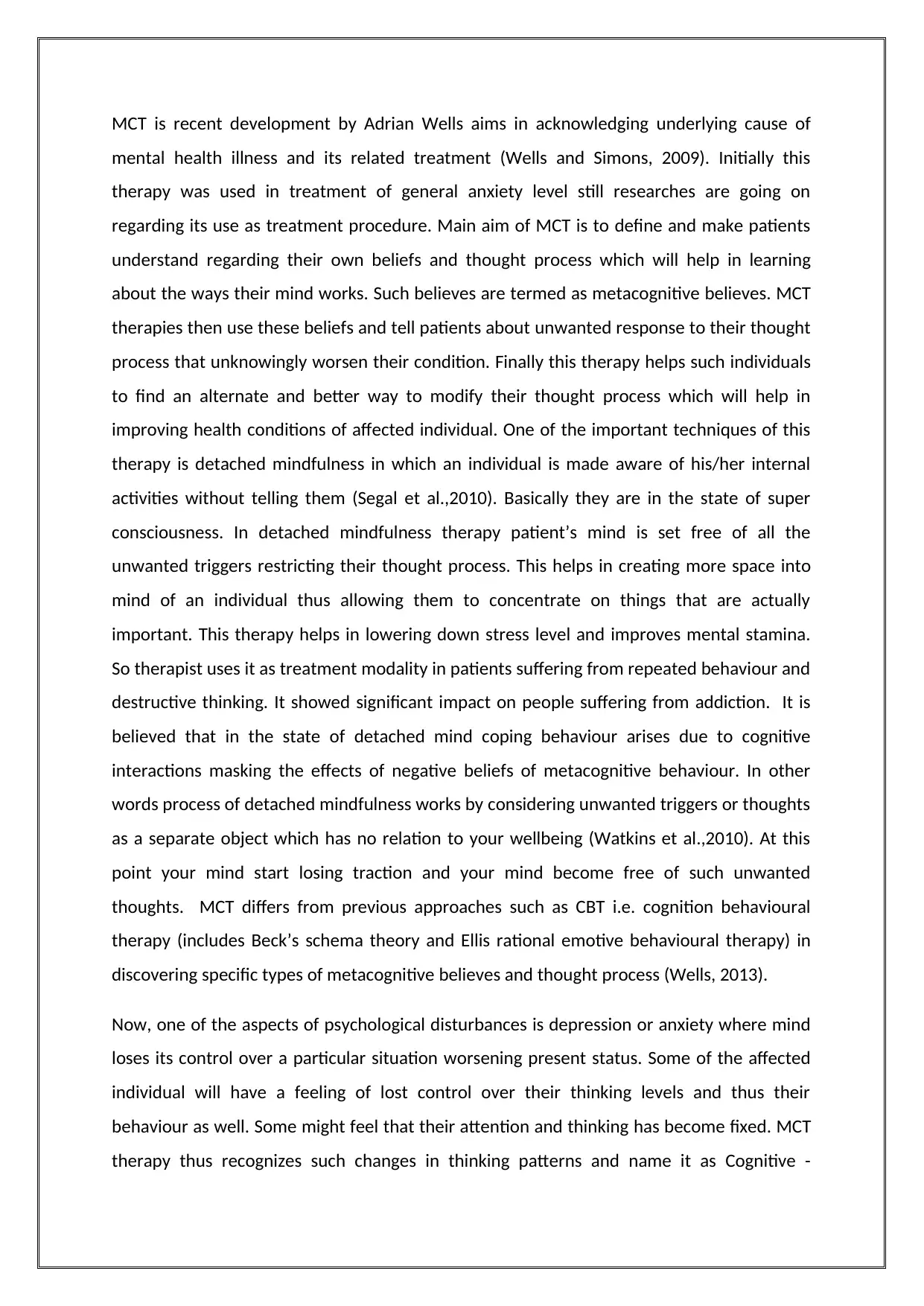
MCT is recent development by Adrian Wells aims in acknowledging underlying cause of
mental health illness and its related treatment (Wells and Simons, 2009). Initially this
therapy was used in treatment of general anxiety level still researches are going on
regarding its use as treatment procedure. Main aim of MCT is to define and make patients
understand regarding their own beliefs and thought process which will help in learning
about the ways their mind works. Such believes are termed as metacognitive believes. MCT
therapies then use these beliefs and tell patients about unwanted response to their thought
process that unknowingly worsen their condition. Finally this therapy helps such individuals
to find an alternate and better way to modify their thought process which will help in
improving health conditions of affected individual. One of the important techniques of this
therapy is detached mindfulness in which an individual is made aware of his/her internal
activities without telling them (Segal et al.,2010). Basically they are in the state of super
consciousness. In detached mindfulness therapy patient’s mind is set free of all the
unwanted triggers restricting their thought process. This helps in creating more space into
mind of an individual thus allowing them to concentrate on things that are actually
important. This therapy helps in lowering down stress level and improves mental stamina.
So therapist uses it as treatment modality in patients suffering from repeated behaviour and
destructive thinking. It showed significant impact on people suffering from addiction. It is
believed that in the state of detached mind coping behaviour arises due to cognitive
interactions masking the effects of negative beliefs of metacognitive behaviour. In other
words process of detached mindfulness works by considering unwanted triggers or thoughts
as a separate object which has no relation to your wellbeing (Watkins et al.,2010). At this
point your mind start losing traction and your mind become free of such unwanted
thoughts. MCT differs from previous approaches such as CBT i.e. cognition behavioural
therapy (includes Beck’s schema theory and Ellis rational emotive behavioural therapy) in
discovering specific types of metacognitive believes and thought process (Wells, 2013).
Now, one of the aspects of psychological disturbances is depression or anxiety where mind
loses its control over a particular situation worsening present status. Some of the affected
individual will have a feeling of lost control over their thinking levels and thus their
behaviour as well. Some might feel that their attention and thinking has become fixed. MCT
therapy thus recognizes such changes in thinking patterns and name it as Cognitive -
mental health illness and its related treatment (Wells and Simons, 2009). Initially this
therapy was used in treatment of general anxiety level still researches are going on
regarding its use as treatment procedure. Main aim of MCT is to define and make patients
understand regarding their own beliefs and thought process which will help in learning
about the ways their mind works. Such believes are termed as metacognitive believes. MCT
therapies then use these beliefs and tell patients about unwanted response to their thought
process that unknowingly worsen their condition. Finally this therapy helps such individuals
to find an alternate and better way to modify their thought process which will help in
improving health conditions of affected individual. One of the important techniques of this
therapy is detached mindfulness in which an individual is made aware of his/her internal
activities without telling them (Segal et al.,2010). Basically they are in the state of super
consciousness. In detached mindfulness therapy patient’s mind is set free of all the
unwanted triggers restricting their thought process. This helps in creating more space into
mind of an individual thus allowing them to concentrate on things that are actually
important. This therapy helps in lowering down stress level and improves mental stamina.
So therapist uses it as treatment modality in patients suffering from repeated behaviour and
destructive thinking. It showed significant impact on people suffering from addiction. It is
believed that in the state of detached mind coping behaviour arises due to cognitive
interactions masking the effects of negative beliefs of metacognitive behaviour. In other
words process of detached mindfulness works by considering unwanted triggers or thoughts
as a separate object which has no relation to your wellbeing (Watkins et al.,2010). At this
point your mind start losing traction and your mind become free of such unwanted
thoughts. MCT differs from previous approaches such as CBT i.e. cognition behavioural
therapy (includes Beck’s schema theory and Ellis rational emotive behavioural therapy) in
discovering specific types of metacognitive believes and thought process (Wells, 2013).
Now, one of the aspects of psychological disturbances is depression or anxiety where mind
loses its control over a particular situation worsening present status. Some of the affected
individual will have a feeling of lost control over their thinking levels and thus their
behaviour as well. Some might feel that their attention and thinking has become fixed. MCT
therapy thus recognizes such changes in thinking patterns and name it as Cognitive -
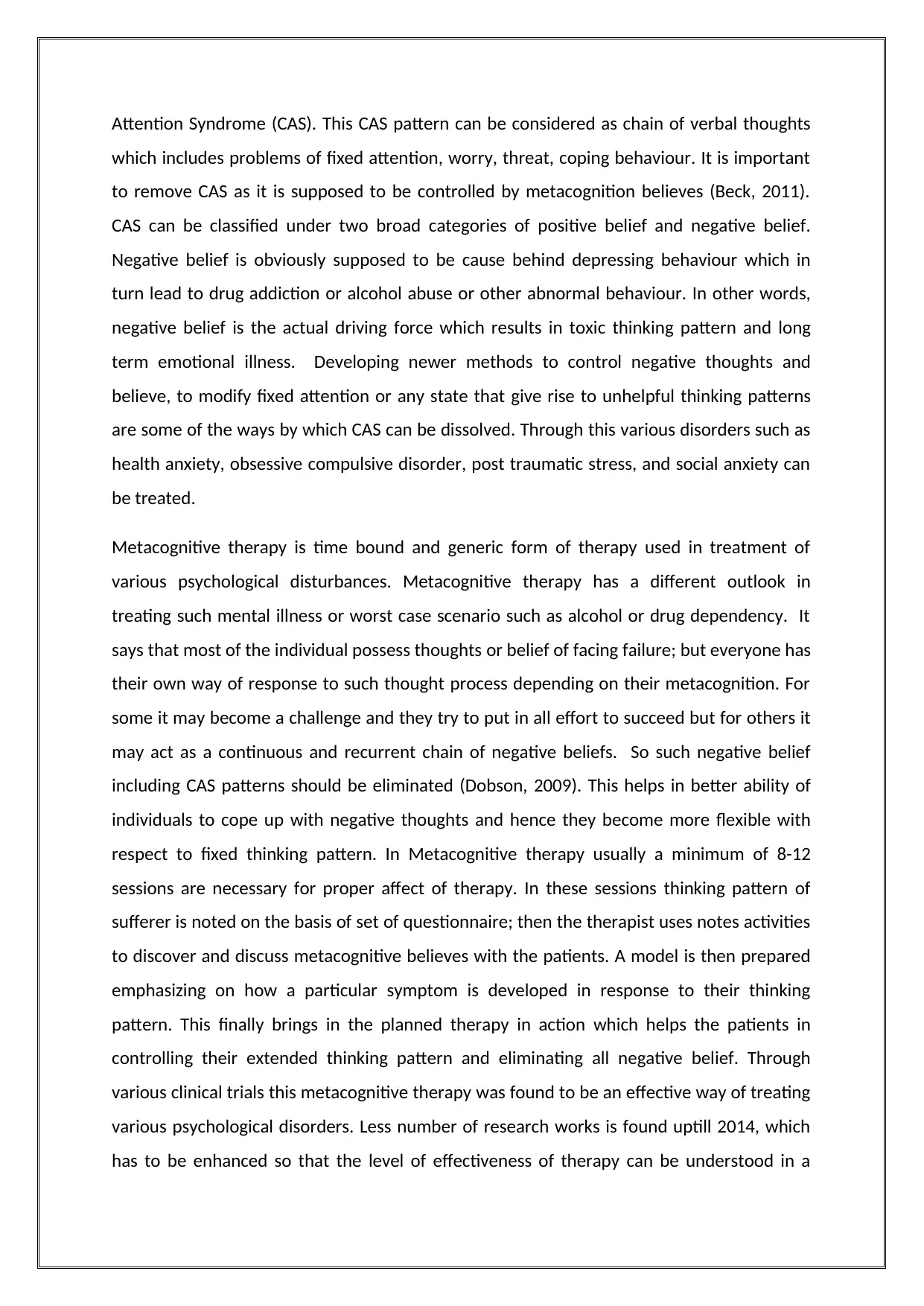
Attention Syndrome (CAS). This CAS pattern can be considered as chain of verbal thoughts
which includes problems of fixed attention, worry, threat, coping behaviour. It is important
to remove CAS as it is supposed to be controlled by metacognition believes (Beck, 2011).
CAS can be classified under two broad categories of positive belief and negative belief.
Negative belief is obviously supposed to be cause behind depressing behaviour which in
turn lead to drug addiction or alcohol abuse or other abnormal behaviour. In other words,
negative belief is the actual driving force which results in toxic thinking pattern and long
term emotional illness. Developing newer methods to control negative thoughts and
believe, to modify fixed attention or any state that give rise to unhelpful thinking patterns
are some of the ways by which CAS can be dissolved. Through this various disorders such as
health anxiety, obsessive compulsive disorder, post traumatic stress, and social anxiety can
be treated.
Metacognitive therapy is time bound and generic form of therapy used in treatment of
various psychological disturbances. Metacognitive therapy has a different outlook in
treating such mental illness or worst case scenario such as alcohol or drug dependency. It
says that most of the individual possess thoughts or belief of facing failure; but everyone has
their own way of response to such thought process depending on their metacognition. For
some it may become a challenge and they try to put in all effort to succeed but for others it
may act as a continuous and recurrent chain of negative beliefs. So such negative belief
including CAS patterns should be eliminated (Dobson, 2009). This helps in better ability of
individuals to cope up with negative thoughts and hence they become more flexible with
respect to fixed thinking pattern. In Metacognitive therapy usually a minimum of 8-12
sessions are necessary for proper affect of therapy. In these sessions thinking pattern of
sufferer is noted on the basis of set of questionnaire; then the therapist uses notes activities
to discover and discuss metacognitive believes with the patients. A model is then prepared
emphasizing on how a particular symptom is developed in response to their thinking
pattern. This finally brings in the planned therapy in action which helps the patients in
controlling their extended thinking pattern and eliminating all negative belief. Through
various clinical trials this metacognitive therapy was found to be an effective way of treating
various psychological disorders. Less number of research works is found uptill 2014, which
has to be enhanced so that the level of effectiveness of therapy can be understood in a
which includes problems of fixed attention, worry, threat, coping behaviour. It is important
to remove CAS as it is supposed to be controlled by metacognition believes (Beck, 2011).
CAS can be classified under two broad categories of positive belief and negative belief.
Negative belief is obviously supposed to be cause behind depressing behaviour which in
turn lead to drug addiction or alcohol abuse or other abnormal behaviour. In other words,
negative belief is the actual driving force which results in toxic thinking pattern and long
term emotional illness. Developing newer methods to control negative thoughts and
believe, to modify fixed attention or any state that give rise to unhelpful thinking patterns
are some of the ways by which CAS can be dissolved. Through this various disorders such as
health anxiety, obsessive compulsive disorder, post traumatic stress, and social anxiety can
be treated.
Metacognitive therapy is time bound and generic form of therapy used in treatment of
various psychological disturbances. Metacognitive therapy has a different outlook in
treating such mental illness or worst case scenario such as alcohol or drug dependency. It
says that most of the individual possess thoughts or belief of facing failure; but everyone has
their own way of response to such thought process depending on their metacognition. For
some it may become a challenge and they try to put in all effort to succeed but for others it
may act as a continuous and recurrent chain of negative beliefs. So such negative belief
including CAS patterns should be eliminated (Dobson, 2009). This helps in better ability of
individuals to cope up with negative thoughts and hence they become more flexible with
respect to fixed thinking pattern. In Metacognitive therapy usually a minimum of 8-12
sessions are necessary for proper affect of therapy. In these sessions thinking pattern of
sufferer is noted on the basis of set of questionnaire; then the therapist uses notes activities
to discover and discuss metacognitive believes with the patients. A model is then prepared
emphasizing on how a particular symptom is developed in response to their thinking
pattern. This finally brings in the planned therapy in action which helps the patients in
controlling their extended thinking pattern and eliminating all negative belief. Through
various clinical trials this metacognitive therapy was found to be an effective way of treating
various psychological disorders. Less number of research works is found uptill 2014, which
has to be enhanced so that the level of effectiveness of therapy can be understood in a
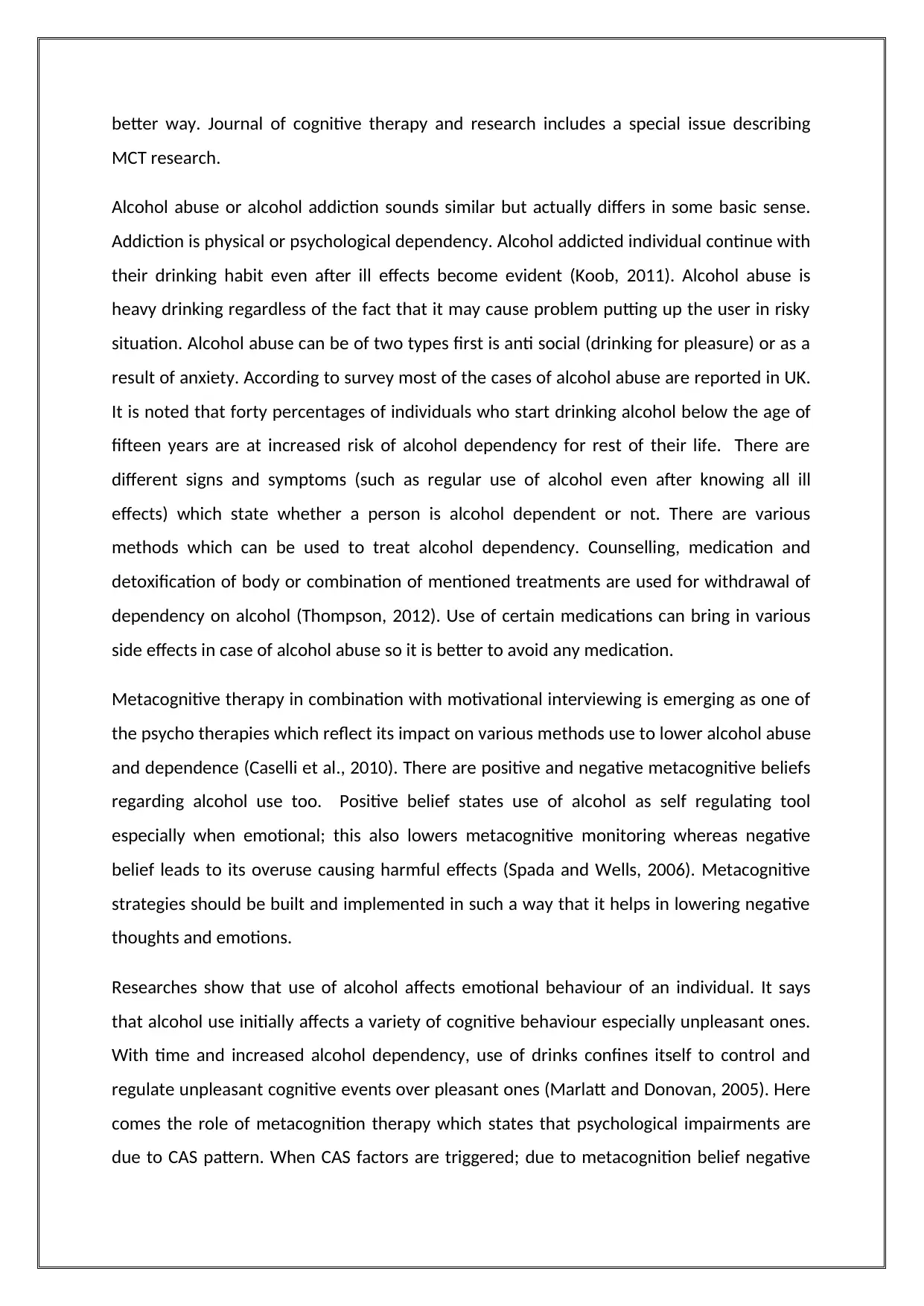
better way. Journal of cognitive therapy and research includes a special issue describing
MCT research.
Alcohol abuse or alcohol addiction sounds similar but actually differs in some basic sense.
Addiction is physical or psychological dependency. Alcohol addicted individual continue with
their drinking habit even after ill effects become evident (Koob, 2011). Alcohol abuse is
heavy drinking regardless of the fact that it may cause problem putting up the user in risky
situation. Alcohol abuse can be of two types first is anti social (drinking for pleasure) or as a
result of anxiety. According to survey most of the cases of alcohol abuse are reported in UK.
It is noted that forty percentages of individuals who start drinking alcohol below the age of
fifteen years are at increased risk of alcohol dependency for rest of their life. There are
different signs and symptoms (such as regular use of alcohol even after knowing all ill
effects) which state whether a person is alcohol dependent or not. There are various
methods which can be used to treat alcohol dependency. Counselling, medication and
detoxification of body or combination of mentioned treatments are used for withdrawal of
dependency on alcohol (Thompson, 2012). Use of certain medications can bring in various
side effects in case of alcohol abuse so it is better to avoid any medication.
Metacognitive therapy in combination with motivational interviewing is emerging as one of
the psycho therapies which reflect its impact on various methods use to lower alcohol abuse
and dependence (Caselli et al., 2010). There are positive and negative metacognitive beliefs
regarding alcohol use too. Positive belief states use of alcohol as self regulating tool
especially when emotional; this also lowers metacognitive monitoring whereas negative
belief leads to its overuse causing harmful effects (Spada and Wells, 2006). Metacognitive
strategies should be built and implemented in such a way that it helps in lowering negative
thoughts and emotions.
Researches show that use of alcohol affects emotional behaviour of an individual. It says
that alcohol use initially affects a variety of cognitive behaviour especially unpleasant ones.
With time and increased alcohol dependency, use of drinks confines itself to control and
regulate unpleasant cognitive events over pleasant ones (Marlatt and Donovan, 2005). Here
comes the role of metacognition therapy which states that psychological impairments are
due to CAS pattern. When CAS factors are triggered; due to metacognition belief negative
MCT research.
Alcohol abuse or alcohol addiction sounds similar but actually differs in some basic sense.
Addiction is physical or psychological dependency. Alcohol addicted individual continue with
their drinking habit even after ill effects become evident (Koob, 2011). Alcohol abuse is
heavy drinking regardless of the fact that it may cause problem putting up the user in risky
situation. Alcohol abuse can be of two types first is anti social (drinking for pleasure) or as a
result of anxiety. According to survey most of the cases of alcohol abuse are reported in UK.
It is noted that forty percentages of individuals who start drinking alcohol below the age of
fifteen years are at increased risk of alcohol dependency for rest of their life. There are
different signs and symptoms (such as regular use of alcohol even after knowing all ill
effects) which state whether a person is alcohol dependent or not. There are various
methods which can be used to treat alcohol dependency. Counselling, medication and
detoxification of body or combination of mentioned treatments are used for withdrawal of
dependency on alcohol (Thompson, 2012). Use of certain medications can bring in various
side effects in case of alcohol abuse so it is better to avoid any medication.
Metacognitive therapy in combination with motivational interviewing is emerging as one of
the psycho therapies which reflect its impact on various methods use to lower alcohol abuse
and dependence (Caselli et al., 2010). There are positive and negative metacognitive beliefs
regarding alcohol use too. Positive belief states use of alcohol as self regulating tool
especially when emotional; this also lowers metacognitive monitoring whereas negative
belief leads to its overuse causing harmful effects (Spada and Wells, 2006). Metacognitive
strategies should be built and implemented in such a way that it helps in lowering negative
thoughts and emotions.
Researches show that use of alcohol affects emotional behaviour of an individual. It says
that alcohol use initially affects a variety of cognitive behaviour especially unpleasant ones.
With time and increased alcohol dependency, use of drinks confines itself to control and
regulate unpleasant cognitive events over pleasant ones (Marlatt and Donovan, 2005). Here
comes the role of metacognition therapy which states that psychological impairments are
due to CAS pattern. When CAS factors are triggered; due to metacognition belief negative
Secure Best Marks with AI Grader
Need help grading? Try our AI Grader for instant feedback on your assignments.
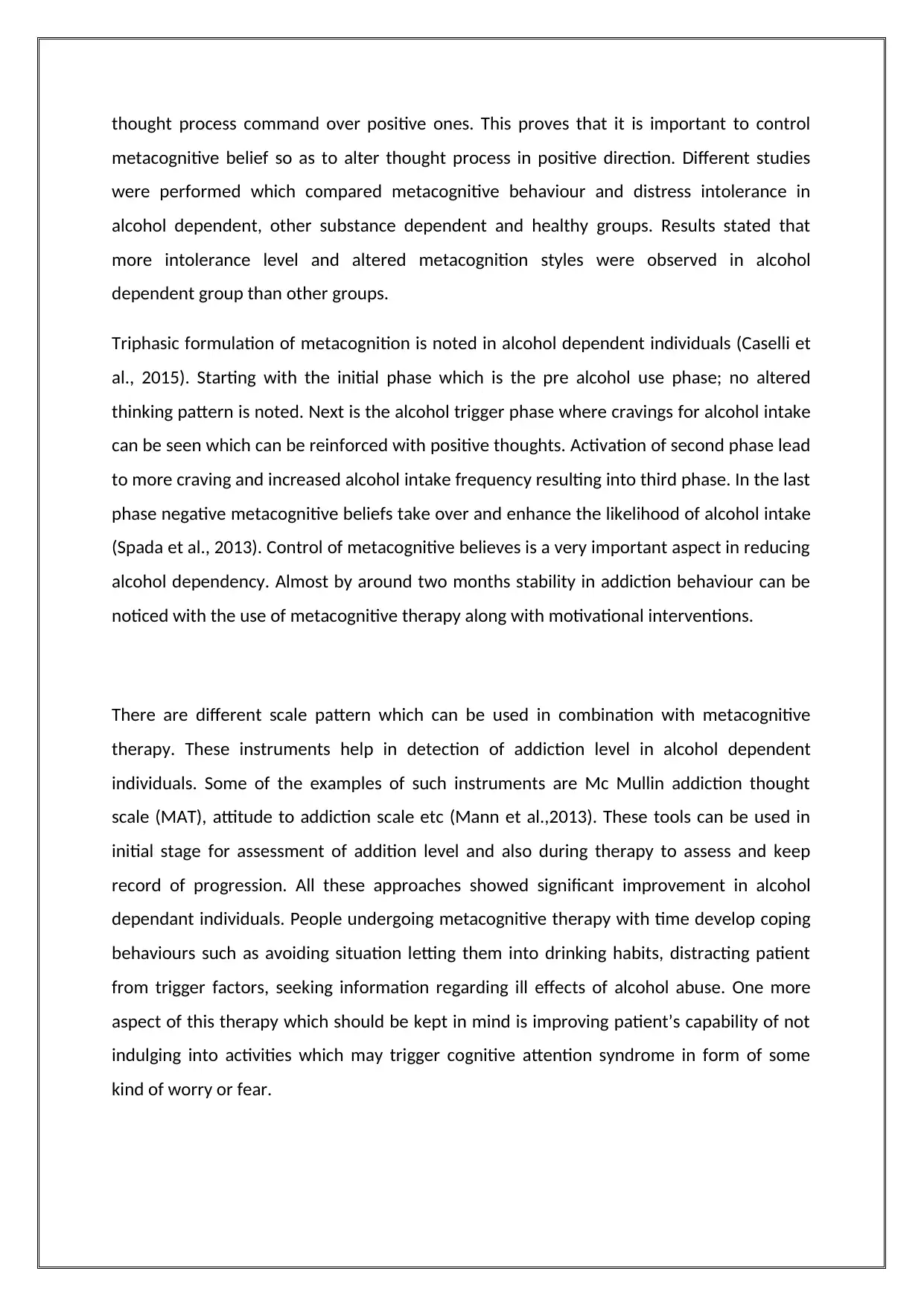
thought process command over positive ones. This proves that it is important to control
metacognitive belief so as to alter thought process in positive direction. Different studies
were performed which compared metacognitive behaviour and distress intolerance in
alcohol dependent, other substance dependent and healthy groups. Results stated that
more intolerance level and altered metacognition styles were observed in alcohol
dependent group than other groups.
Triphasic formulation of metacognition is noted in alcohol dependent individuals (Caselli et
al., 2015). Starting with the initial phase which is the pre alcohol use phase; no altered
thinking pattern is noted. Next is the alcohol trigger phase where cravings for alcohol intake
can be seen which can be reinforced with positive thoughts. Activation of second phase lead
to more craving and increased alcohol intake frequency resulting into third phase. In the last
phase negative metacognitive beliefs take over and enhance the likelihood of alcohol intake
(Spada et al., 2013). Control of metacognitive believes is a very important aspect in reducing
alcohol dependency. Almost by around two months stability in addiction behaviour can be
noticed with the use of metacognitive therapy along with motivational interventions.
There are different scale pattern which can be used in combination with metacognitive
therapy. These instruments help in detection of addiction level in alcohol dependent
individuals. Some of the examples of such instruments are Mc Mullin addiction thought
scale (MAT), attitude to addiction scale etc (Mann et al.,2013). These tools can be used in
initial stage for assessment of addition level and also during therapy to assess and keep
record of progression. All these approaches showed significant improvement in alcohol
dependant individuals. People undergoing metacognitive therapy with time develop coping
behaviours such as avoiding situation letting them into drinking habits, distracting patient
from trigger factors, seeking information regarding ill effects of alcohol abuse. One more
aspect of this therapy which should be kept in mind is improving patient’s capability of not
indulging into activities which may trigger cognitive attention syndrome in form of some
kind of worry or fear.
metacognitive belief so as to alter thought process in positive direction. Different studies
were performed which compared metacognitive behaviour and distress intolerance in
alcohol dependent, other substance dependent and healthy groups. Results stated that
more intolerance level and altered metacognition styles were observed in alcohol
dependent group than other groups.
Triphasic formulation of metacognition is noted in alcohol dependent individuals (Caselli et
al., 2015). Starting with the initial phase which is the pre alcohol use phase; no altered
thinking pattern is noted. Next is the alcohol trigger phase where cravings for alcohol intake
can be seen which can be reinforced with positive thoughts. Activation of second phase lead
to more craving and increased alcohol intake frequency resulting into third phase. In the last
phase negative metacognitive beliefs take over and enhance the likelihood of alcohol intake
(Spada et al., 2013). Control of metacognitive believes is a very important aspect in reducing
alcohol dependency. Almost by around two months stability in addiction behaviour can be
noticed with the use of metacognitive therapy along with motivational interventions.
There are different scale pattern which can be used in combination with metacognitive
therapy. These instruments help in detection of addiction level in alcohol dependent
individuals. Some of the examples of such instruments are Mc Mullin addiction thought
scale (MAT), attitude to addiction scale etc (Mann et al.,2013). These tools can be used in
initial stage for assessment of addition level and also during therapy to assess and keep
record of progression. All these approaches showed significant improvement in alcohol
dependant individuals. People undergoing metacognitive therapy with time develop coping
behaviours such as avoiding situation letting them into drinking habits, distracting patient
from trigger factors, seeking information regarding ill effects of alcohol abuse. One more
aspect of this therapy which should be kept in mind is improving patient’s capability of not
indulging into activities which may trigger cognitive attention syndrome in form of some
kind of worry or fear.
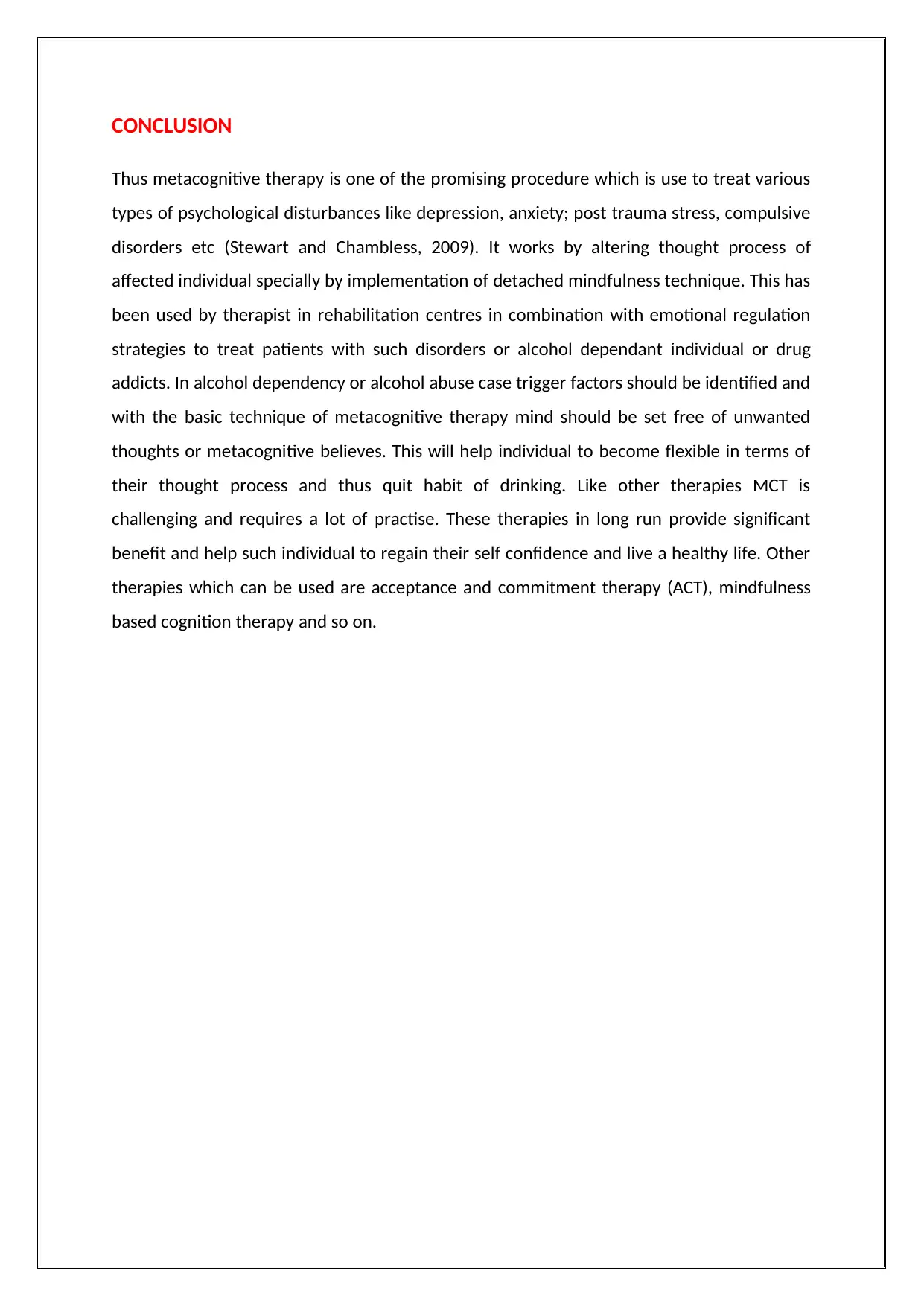
CONCLUSION
Thus metacognitive therapy is one of the promising procedure which is use to treat various
types of psychological disturbances like depression, anxiety; post trauma stress, compulsive
disorders etc (Stewart and Chambless, 2009). It works by altering thought process of
affected individual specially by implementation of detached mindfulness technique. This has
been used by therapist in rehabilitation centres in combination with emotional regulation
strategies to treat patients with such disorders or alcohol dependant individual or drug
addicts. In alcohol dependency or alcohol abuse case trigger factors should be identified and
with the basic technique of metacognitive therapy mind should be set free of unwanted
thoughts or metacognitive believes. This will help individual to become flexible in terms of
their thought process and thus quit habit of drinking. Like other therapies MCT is
challenging and requires a lot of practise. These therapies in long run provide significant
benefit and help such individual to regain their self confidence and live a healthy life. Other
therapies which can be used are acceptance and commitment therapy (ACT), mindfulness
based cognition therapy and so on.
Thus metacognitive therapy is one of the promising procedure which is use to treat various
types of psychological disturbances like depression, anxiety; post trauma stress, compulsive
disorders etc (Stewart and Chambless, 2009). It works by altering thought process of
affected individual specially by implementation of detached mindfulness technique. This has
been used by therapist in rehabilitation centres in combination with emotional regulation
strategies to treat patients with such disorders or alcohol dependant individual or drug
addicts. In alcohol dependency or alcohol abuse case trigger factors should be identified and
with the basic technique of metacognitive therapy mind should be set free of unwanted
thoughts or metacognitive believes. This will help individual to become flexible in terms of
their thought process and thus quit habit of drinking. Like other therapies MCT is
challenging and requires a lot of practise. These therapies in long run provide significant
benefit and help such individual to regain their self confidence and live a healthy life. Other
therapies which can be used are acceptance and commitment therapy (ACT), mindfulness
based cognition therapy and so on.
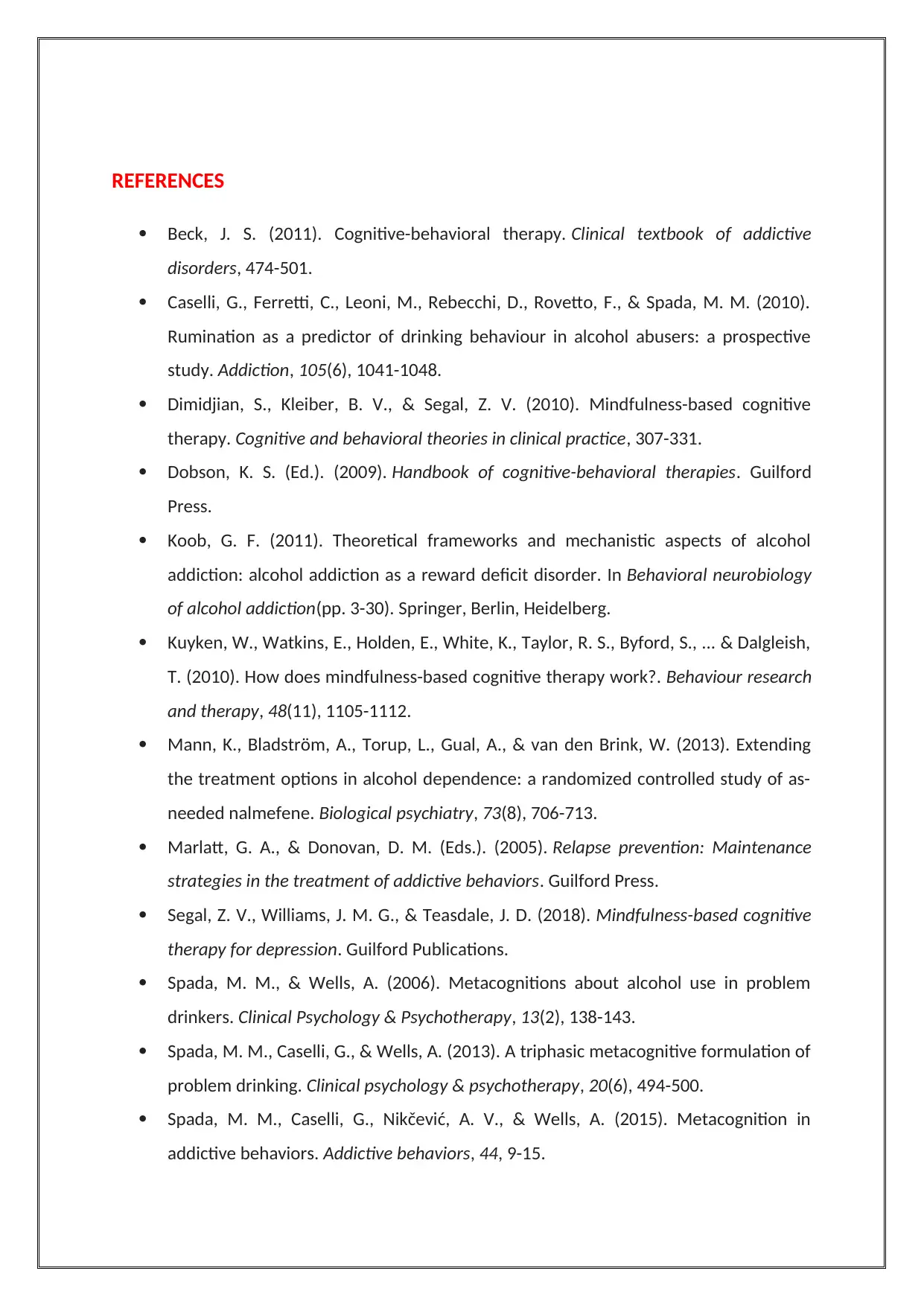
REFERENCES
Beck, J. S. (2011). Cognitive-behavioral therapy. Clinical textbook of addictive
disorders, 474-501.
Caselli, G., Ferretti, C., Leoni, M., Rebecchi, D., Rovetto, F., & Spada, M. M. (2010).
Rumination as a predictor of drinking behaviour in alcohol abusers: a prospective
study. Addiction, 105(6), 1041-1048.
Dimidjian, S., Kleiber, B. V., & Segal, Z. V. (2010). Mindfulness-based cognitive
therapy. Cognitive and behavioral theories in clinical practice, 307-331.
Dobson, K. S. (Ed.). (2009). Handbook of cognitive-behavioral therapies. Guilford
Press.
Koob, G. F. (2011). Theoretical frameworks and mechanistic aspects of alcohol
addiction: alcohol addiction as a reward deficit disorder. In Behavioral neurobiology
of alcohol addiction(pp. 3-30). Springer, Berlin, Heidelberg.
Kuyken, W., Watkins, E., Holden, E., White, K., Taylor, R. S., Byford, S., ... & Dalgleish,
T. (2010). How does mindfulness-based cognitive therapy work?. Behaviour research
and therapy, 48(11), 1105-1112.
Mann, K., Bladström, A., Torup, L., Gual, A., & van den Brink, W. (2013). Extending
the treatment options in alcohol dependence: a randomized controlled study of as-
needed nalmefene. Biological psychiatry, 73(8), 706-713.
Marlatt, G. A., & Donovan, D. M. (Eds.). (2005). Relapse prevention: Maintenance
strategies in the treatment of addictive behaviors. Guilford Press.
Segal, Z. V., Williams, J. M. G., & Teasdale, J. D. (2018). Mindfulness-based cognitive
therapy for depression. Guilford Publications.
Spada, M. M., & Wells, A. (2006). Metacognitions about alcohol use in problem
drinkers. Clinical Psychology & Psychotherapy, 13(2), 138-143.
Spada, M. M., Caselli, G., & Wells, A. (2013). A triphasic metacognitive formulation of
problem drinking. Clinical psychology & psychotherapy, 20(6), 494-500.
Spada, M. M., Caselli, G., Nikčević, A. V., & Wells, A. (2015). Metacognition in
addictive behaviors. Addictive behaviors, 44, 9-15.
Beck, J. S. (2011). Cognitive-behavioral therapy. Clinical textbook of addictive
disorders, 474-501.
Caselli, G., Ferretti, C., Leoni, M., Rebecchi, D., Rovetto, F., & Spada, M. M. (2010).
Rumination as a predictor of drinking behaviour in alcohol abusers: a prospective
study. Addiction, 105(6), 1041-1048.
Dimidjian, S., Kleiber, B. V., & Segal, Z. V. (2010). Mindfulness-based cognitive
therapy. Cognitive and behavioral theories in clinical practice, 307-331.
Dobson, K. S. (Ed.). (2009). Handbook of cognitive-behavioral therapies. Guilford
Press.
Koob, G. F. (2011). Theoretical frameworks and mechanistic aspects of alcohol
addiction: alcohol addiction as a reward deficit disorder. In Behavioral neurobiology
of alcohol addiction(pp. 3-30). Springer, Berlin, Heidelberg.
Kuyken, W., Watkins, E., Holden, E., White, K., Taylor, R. S., Byford, S., ... & Dalgleish,
T. (2010). How does mindfulness-based cognitive therapy work?. Behaviour research
and therapy, 48(11), 1105-1112.
Mann, K., Bladström, A., Torup, L., Gual, A., & van den Brink, W. (2013). Extending
the treatment options in alcohol dependence: a randomized controlled study of as-
needed nalmefene. Biological psychiatry, 73(8), 706-713.
Marlatt, G. A., & Donovan, D. M. (Eds.). (2005). Relapse prevention: Maintenance
strategies in the treatment of addictive behaviors. Guilford Press.
Segal, Z. V., Williams, J. M. G., & Teasdale, J. D. (2018). Mindfulness-based cognitive
therapy for depression. Guilford Publications.
Spada, M. M., & Wells, A. (2006). Metacognitions about alcohol use in problem
drinkers. Clinical Psychology & Psychotherapy, 13(2), 138-143.
Spada, M. M., Caselli, G., & Wells, A. (2013). A triphasic metacognitive formulation of
problem drinking. Clinical psychology & psychotherapy, 20(6), 494-500.
Spada, M. M., Caselli, G., Nikčević, A. V., & Wells, A. (2015). Metacognition in
addictive behaviors. Addictive behaviors, 44, 9-15.
Paraphrase This Document
Need a fresh take? Get an instant paraphrase of this document with our AI Paraphraser
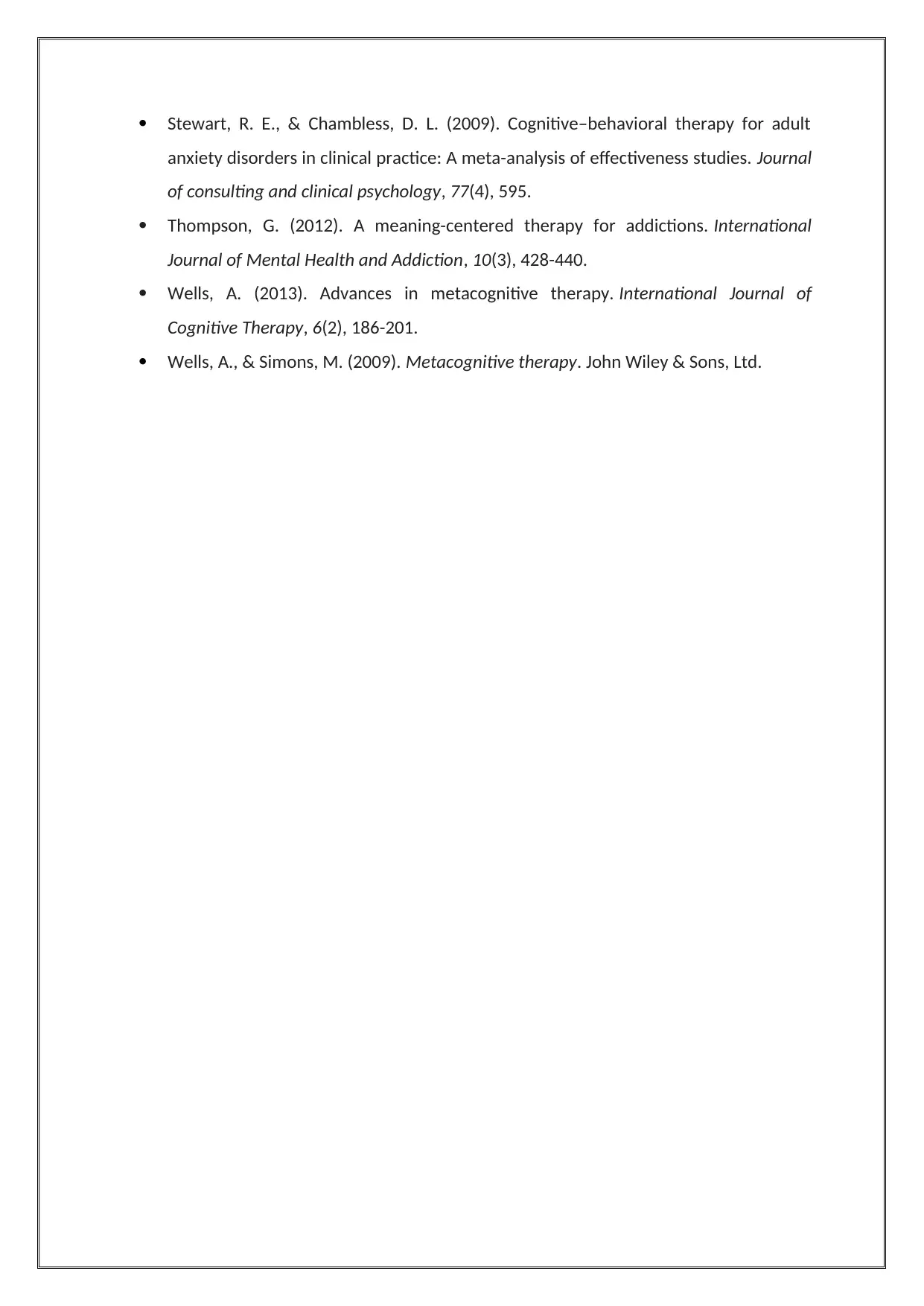
Stewart, R. E., & Chambless, D. L. (2009). Cognitive–behavioral therapy for adult
anxiety disorders in clinical practice: A meta-analysis of effectiveness studies. Journal
of consulting and clinical psychology, 77(4), 595.
Thompson, G. (2012). A meaning-centered therapy for addictions. International
Journal of Mental Health and Addiction, 10(3), 428-440.
Wells, A. (2013). Advances in metacognitive therapy. International Journal of
Cognitive Therapy, 6(2), 186-201.
Wells, A., & Simons, M. (2009). Metacognitive therapy. John Wiley & Sons, Ltd.
anxiety disorders in clinical practice: A meta-analysis of effectiveness studies. Journal
of consulting and clinical psychology, 77(4), 595.
Thompson, G. (2012). A meaning-centered therapy for addictions. International
Journal of Mental Health and Addiction, 10(3), 428-440.
Wells, A. (2013). Advances in metacognitive therapy. International Journal of
Cognitive Therapy, 6(2), 186-201.
Wells, A., & Simons, M. (2009). Metacognitive therapy. John Wiley & Sons, Ltd.
1 out of 8
Related Documents
Your All-in-One AI-Powered Toolkit for Academic Success.
+13062052269
info@desklib.com
Available 24*7 on WhatsApp / Email
![[object Object]](/_next/static/media/star-bottom.7253800d.svg)
Unlock your academic potential
© 2024 | Zucol Services PVT LTD | All rights reserved.



